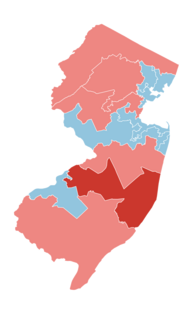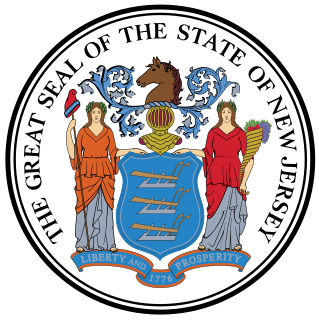
These are tables of congressional delegations from New Jersey to the United States Senate and United States House of Representatives.

The 1970 United States Senate elections was an election for the United States Senate, taking place in the middle of Richard Nixon's first term as President. The Democrats lost a net of three seats, while the Republicans and the Conservative Party of New York picked up one net seat each, and former Democrat Harry F. Byrd Jr. was re-elected as an independent.

The United States Senate elections of 1928 were elections that coincided with the presidential election of Republican Herbert Hoover. The strong economy helped the Republicans to gain seven seats from the Democrats.

Elections to the United States House of Representatives for the 37th Congress were held at various dates in different states from August 1860 to October 1861.

The 2006 United States House of Representatives elections were held on November 7, 2006, to elect members to the United States House of Representatives. It took place in the middle of President George W. Bush's second term in office. All 435 seats of the House were up for election. Those elected served in the 110th United States Congress from January 3, 2007, until January 3, 2009. The incumbent majority party, the Republicans, had won majorities in the House consecutively since 1994, and were defeated by the Democrats who won a majority in the chamber, ending 12 years of Republican control in the House.

Albio B. Sires is a Cuban-American politician serving as the U.S. Representative for New Jersey's 8th congressional district, serving since 2006. The district, numbered as the 13th district from 2006 to 2013, includes most of northern and eastern Jersey City, as well as most of the Latino neighborhoods of Newark. He is a member of the Democratic Party. He previously represented district 33 in the New Jersey General Assembly from 2000 to 2006.

New Jersey's 13th congressional district was a congressional district which was created for the 73rd United States Congress in 1933, based on redistricting following the United States Census, 1930. It was last represented by Democrat Albio Sires when it was eliminated due to redistricting following the United States Census, 2010.

The 2008 United States House of Representatives elections were held on November 4, 2008, to elect members to the United States House of Representatives to serve in the 111th United States Congress from January 3, 2009, until January 3, 2011. It coincided with the election of Barack Obama as President. All 435 voting seats, as well as all 6 non-voting seats, were up for election. The Democratic Party, which won a majority of seats in the 2006 election, expanded its control in 2008. The Republican Party, hoping to regain the majority it lost in the 2006 election or at least expand its congressional membership, lost additional seats. With one exception, the only seats to switch from Democratic to Republican had been Republican-held prior to the 2006 elections. Republicans gained five Democratic seats total, while losing 26 of their own, giving the Democrats a net gain of 21 seats, effectively erasing all gains made by the GOP since 1994. In addition, with the defeat of Republican congressman Chris Shays in Connecticut's 4th district, this became the first time since the 1850s that no Republican represented the New England region. The 10.6% popular vote advantage by the Democrats was the largest by either party since 1982, 26 years earlier. Turnout increased due to the 2008 presidential election. The presidential election, 2008 Senate elections, and 2008 state gubernatorial elections, as well as many other state and local elections, occurred on the same date.

The New Jersey Democratic State Committee (NJDSC) is the affiliate of the Democratic Party in the state of New Jersey. John Currie is serving as chairman and Peg Schaffer is the vice-chairwoman.

The 2006 Texas 22nd congressional district election for the 110th Congress was held on November 7, 2006, and attracted considerable attention because this district was represented by former House Majority Leader Tom DeLay, a prominent member of the Republican Party, who resigned after being indicted and subsequently winning the Republican primary. Because of Texas state law, Republicans, in order to hold on to the seat, would have had to win a write-in campaign, something that has only been done four other times in the history of U.S. Congressional elections.

The Arizona 1st congressional district election, 2006 was an election for the United States House of Representatives. The two main candidates were two-term Republican incumbent Rick Renzi and Democratic civil rights attorney Ellen Simon. Renzi defeated Simon by a 52% to 44% margin.

The 2006 United States House elections in Pennsylvania was an election for Pennsylvania's delegation to the United States House of Representatives, which occurred as part of the general election of the House of Representatives on November 7, 2006.

The 2008 congressional elections in New Jersey were held on November 4, 2008 to determine who would represent the state of New Jersey in the United States House of Representatives. New Jersey has thirteen seats in the House, apportioned according to the 2000 United States Census. Representatives are elected for two-year terms; those elected will serve in the 111th Congress from January 4, 2009 until January 3, 2011. The election coincided with the 2008 U.S. presidential election.

The 2006 United States House of Representatives elections in New Jersey were held on November 4, 2006 to determine who will represent the state of New Jersey in the United States House of Representatives. New Jersey has thirteen seats in the House, apportioned according to the 2000 United States Census. Representatives are elected for two-year terms.

The 2010 congressional elections in New Jersey were held on November 4, 2010 to determine who would represent the state of New Jersey in the United States House of Representatives. New Jersey has thirteen seats in the House, apportioned according to the 2000 United States Census. Representatives are elected for two-year terms; those elected will serve in the 111th Congress from January 2011 until January 2013.

The 2012 United States House of Representatives elections in New Jersey were held on Tuesday, November 6, 2012 and elected the 12 U.S. Representatives from the state of New Jersey, a loss of one seat following the 2010 United States Census. The elections coincided with the elections of other federal and state offices, including a quadrennial presidential election and an election to the U.S. Senate.

The 2014 United States House of Representatives elections in New Jersey were held on Tuesday, November 4, 2014 to elect the 12 U.S. Representatives from the state of New Jersey, one from each of the state's 12 congressional districts. The elections coincided with the 2014 United States midterm elections for other federal and state offices, including U.S. House elections in other states and a U.S. Senate election in New Jersey.

The 2017 United States elections were held, in large part, on Tuesday, November 7, 2017. This off-year election featured gubernatorial elections in Virginia and New Jersey, as well as state legislative elections in both houses of the New Jersey Legislature and in the Virginia House of Delegates. Numerous citizen initiatives, mayoral races, and a variety of other local elections also occurred. Special elections were also held for one seat of the U.S. Senate, representing Alabama, and six seats of the U.S. House of Representatives.
The 1971 New Jersey State Senate Elections was the mid-term election of Republican William Cahill's term as Governor of New Jersey. Democrats picked up nine Senate seats. Sixteen incumbents did not seek re-election.

The 2016 United States House of Representatives elections in New Jersey were held on November 8, 2016, to elect the 12 U.S. Representatives from the state of New Jersey, one from each of the state's 12 congressional districts. The elections coincided with the 2016 U.S. presidential election, as well as other elections to the House of Representatives, elections to the United States Senate and various state and local elections. The primaries were held on June 7.



















